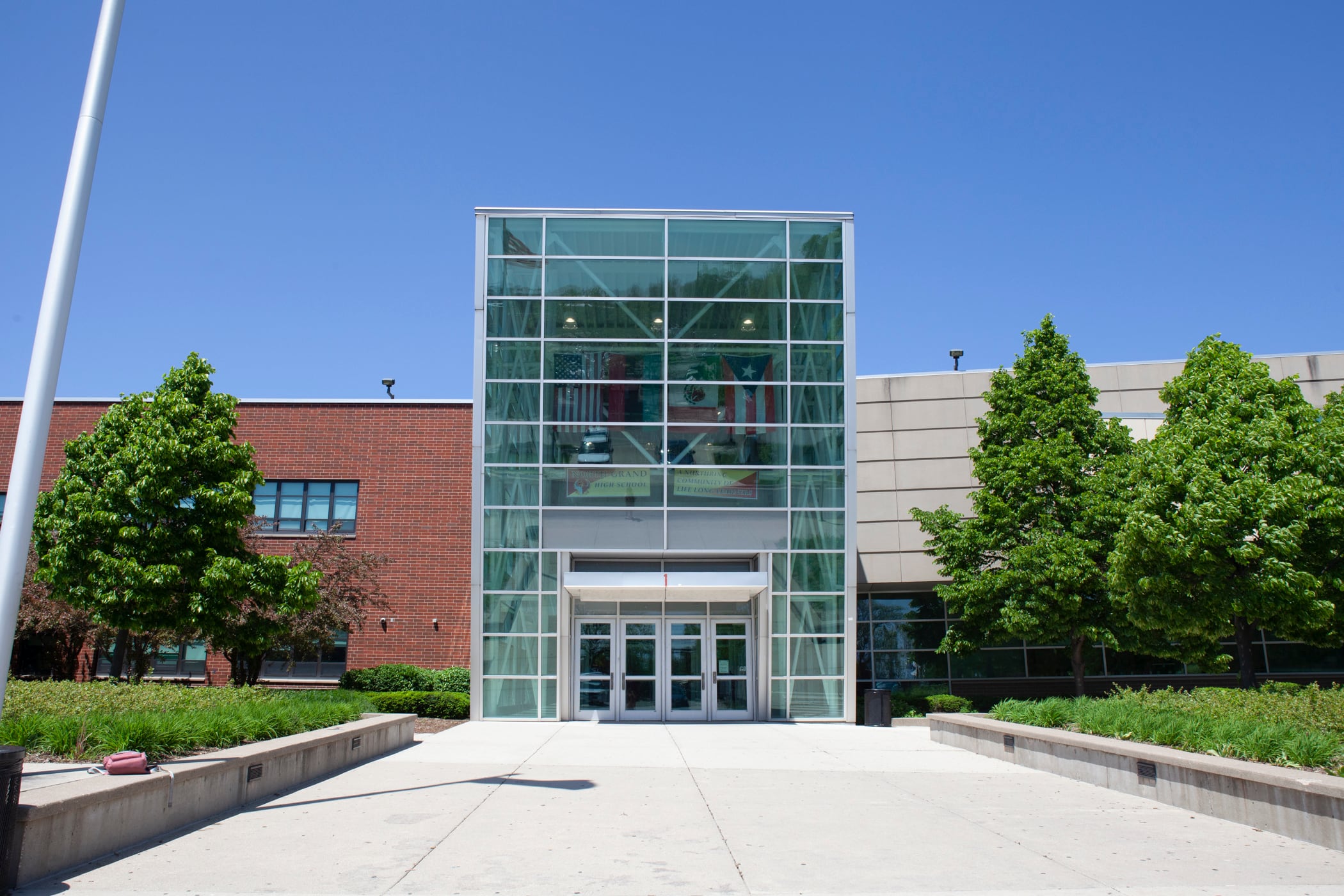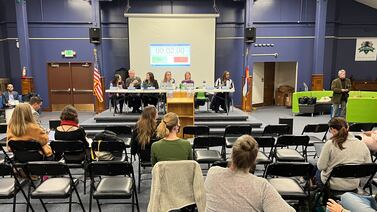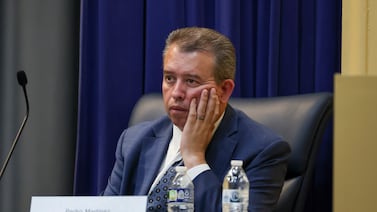With a whirlwind summer of police votes coming to an end, the future of Chicago’s school police program now goes to the board of education.
Board members will consider two items Wednesday: whether to renew a modified contract with the Chicago Police Department for school officers and, in a surprise addition, a resolution that would call for schools to create safety plans with the goal of eventually removing officers from campuses.
In recent months, Chicago has seen a flurry of activity around school policing. Activists, who were inspired by the Minneapolis school district’s decision to cut ties with the local police department after a white police officer killed George Floyd, began pushing for the same in Chicago. They put pressure on the mayor, city council, and school board, but Chicago punted the decision to individual school councils. After weeks of voting and amid concerns about the process, most schools decided to keep their police officers. Then, earlier this month, district officials announced a series of reforms to the police program, cutting the overall cost and raising the bar for which officers could serve on campuses.
That leaves the board with a less expensive but mostly intact school police program to consider renewing alongside a resolution that would push the district to make plans for a future of police-free schools. Sendhil Revuluri, board vice president who drafted the resolutions, said his hope was to push the conversation on school safety beyond just ending the school police program. “For lasting change that benefits students, we must provide schools with real alternatives, and schools must change how they think and act around safety,” he said.
The resolution, however, stops short of mandating a specific date by which officers would be phased out or next steps for the district once the plan is developed.
That’s left some advocates and board members calling for more.
Board member Amy Rome said she would support a policy with a definitive end date for the school police program and a clear promise to include student voices. “The language of this resolution does not read definitely enough,” said Rome, who helped draft the board vote to terminate the contract earlier this summer. That vote failed by a narrow margin.
Last week, district leaders announced a series of new reforms to the police program, including stricter protocols on which police officers serve on campuses and a plan to remove school-based computer terminals that previously connected officers with centralized criminal databases. The week before, the city revealed that the cost of the school police contract would now likely be cut from $33 million to $12 million, once the school board votes on a new budget proposal.
Even as district officials have promised changes to the school police program, a majority of votes by local school councils over the summer were in favor of keeping police officers.
Neither the reforms or the votes have deterred advocates who say they want police out of schools altogether. They have increased pressure on the board ahead of Wednesday’s votes.
“You can’t address a systemic issue by dividing it up - the board of education needs to take leadership when it comes to this,” said Maria Degillo, an organizer with Voices of Youth in Chicago Education.
Student groups at the forefront of recent protests against school police held a sit-in at Chicago Public Schools headquarters Monday afternoon to call for more restorative justice options.
“Our schools are in need of resources that truly address the root causes of our issues. If a student is acting out, ask them: ‘Have you eaten today? What does your home situation look like? How can I best support you?’ We are ready to reimagine what our schools would look like without police,” Santiago Magana, a junior at Kelly College Prep in Brighton Park, said in a statement.
A coalition of union, neighborhood, and progressive political groups, including the Chicago Teachers Union and United Working Families, released a statement Monday rejecting recent reforms to the school police contract, saying they “do not meet the moment or burdens.”
Instead, they called for the district to “undertake robust community engagement processes to develop alternative school safety plans, and provide school campuses with the resources they need to address conflicts and keep students safe.”
The new resolution to phase out school police addresses some of those concerns. It instructs schools chief Janice Jackson to develop new school safety plans — without police officers — by the spring. The plans would be developed in close collaboration with school communities and include ongoing evaluations of student safety and additional funding to help schools use alternative safety measures.
“It is the sense of the Board of Education that there are alternatives to the SRO Program in CPS that will more effectively build positive community relationships, ensure a safe learning environment for students and address students’ social and emotional needs,” the resolution states.
Revuluri said its important to put some of responsibility for creating new safety solutions on experts at the district level. “School communities can work in partnership with district experts to create and implement alternatives that ensure their students are physically and psychologically safe and supported in their learning and growth,” he said.
But critics say the resolution doesn’t expressly include the term “restorative justice” or a plan to include student voice. “I would want the resolution to state that these options are restorative, and really again underscoring community input,” Rome said.
Board members have been split on the school police issue. Elizabeth Todd-Breland and Rome introduced a resolution in June to terminate the school police contract. The measure lost by a narrow margin, with other board members, including board president Miguel Del Valle, making an impassioned case for police as an integral part of school safety, even as they acknowledged that the program needs reforms.
The board members who voted against terminating the contract in June said they would allow local school councils to decide whether to keep officers. The councils were granted the authority last year as part of a spate of federally mandated reforms. In all, 55 councils voted to keep police and 17 voted to remove them. But the process was dogged by transparency issues, from concerns about how to access the virtual meetings to whether councils included sufficient student or community voice in their decisions.
Now, the question is whether the new resolution will garner the support of enough board members or if the board will accept the modified police contract.







